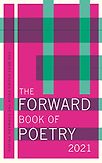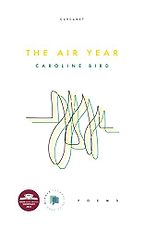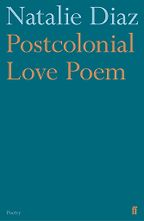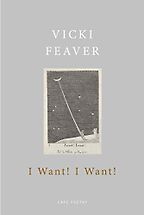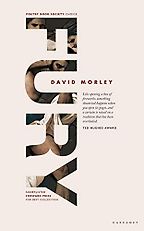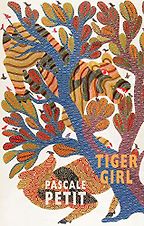The Forward Prize for Poetry, which you chaired the judging of this year, is the most coveted poetry award in the UK and Ireland. How does the judging process work? It must have been very hard to choose the ‘best’ books of 2020, when poetry appreciation is so subjective.
It’s a long and intense judging process, with much re-reading and comparing and debating along the way. There are five judges each year, each bringing a new and contrasting point of view. The Forward panel always includes practising poets – major figures who are taking the art form in new directions – and also writers in other genres. This year poets Kim Moore, Roger Robinson and David Wheatley were joined by novelist and critic Leaf Arbuthnot. I was daunted at first by the idea of chairing: I’m not a contemporary poetry specialist. On the other hand I’ve been writing about literature all my life, and am passionately interested in the conversations that go on across time, across genres. Though we all came with different perspectives, there were many books that united us and it was wonderful to explore our shared appreciation.
The Forward Prize has always aimed to attract different kinds of readers, and to draw new audiences to contemporary writing. It’s there in the vanguard, identifying bold and experimental new voices, and also emphasising the power of poetry to speak outwards, mattering to many different people.
I love the idea of ‘practicing poets’, indicating the existence of lapsed poets too. How many submissions did you have for the prize for the best poetry collection of 2020?
Well, we had 123 books entered for the Best Collection prize. And another 85 books submitted for the Felix Dennis Prize for Best First Collection – which was won in the end by Will Harris for his collection RENDANG. So there were 203 books altogether: a magnificent number of entries. It was a revelation to me, and I think even to other judges who spend their lives keeping up with new poetry, just how much is being published. I got a sense of what the different poetry publishers are fostering, and the wealth of superlative work published in Ireland and Scotland.
We all had our separate hard-won lists, and tried to see how they overlapped. I loved the eloquent advocacy of each judge for the things that mattered to them. One judge emphasised qualities of surprise, the confounding of expectation. For another there needed to be some sense of responding to the world—however historical it might be, however bound up with the past, it had to speak to the moment.
Get the weekly Five Books newsletter
So we all had our priorities, and were desperately trying to read each other and understand each other on Zoom, of course. But to me it was heart lifting: the quality of the attention we all gave to it. Everyone paid such deep, close, discriminating attention. This was four months’ work, reading these poems. Because you cannot read poetry collections quickly. I think we all felt that this is what poetry is about: paying attention, trying to think your way into other people’s worlds. You’ve got to empty yourself out a bit in order to be shown something new. Giving time and space to these poems felt like a worthwhile job during the pandemic, it really did.
As we neared the final decision, whenever we tried to put one book aside, someone would say ‘I miss that book,’ or, ‘I can’t be without it, can we have it back?’ There was a sense that every shortlisted collection brought something we really needed and wanted at that table.
Often it was to do with the shape of the book as a whole: its echoes and juxtapositions, the shapes it makes in the mind, the capacity to grow richer with each reading. That was exhilarating.
That’s a wonderful way to put it. Let’s talk about the books on the shortlist, starting with the book that won the title of best poetry collection of 2020. This year’s winner was Caroline Bird, with her collection The Air Year. An ‘air’ year being the year of a relationship before its first, ‘paper’, anniversary.
That’s it. Yes, it picks up on the energy and passion of the first year of a relationship; it’s a book of such hurtling wild energy that it’s difficult to find landing places in it. That’s partly what the poetry is concerned with: we’ve been launched into flight, or freefall, and we’re looking for somewhere to land. How do we find landing places for ourselves?
It makes use of everything that poets do: finding measures and making forms. It’s very absorbing. Caroline Bird talks about finding clearings in forests—she gives her reader that sense of searching through a forest, and suddenly coming to a clearing. That’s your place of clarity, the place where you land.
“She picks up on the energy and passion of the first year of a relationship”
She’s a surrealist. It’s very much in dialogue with the modernist surrealists, experimenting with errant and outlandish patterns of association. But the exuberance of imagery—daffodils dunked in milk pails and windmills in vacuum-packed villages—is held in balance with a sort of melancholy and despair, in a way that is very mobile. You can never quite pinpoint its tone. You can go back to it and find it falls slightly differently with every reading. It’s full of grief and shame. It’s quite vertiginous, as if you’re on this tightrope over deep wells. If you stop, you might fall—but it’s not complaining, it’s accepting the dangerousness of being alive. So we were excited about the tumbling acts of this book.
I love that. Next we’re going to discuss Natalie Diaz’s Postcolonial Love Poem, but before we do, I just want to ask you to clarify what books are eligible for this prize, because I know that Natalie is an American; she is of Mojave origin.
Exactly, yes, these are all books published in the UK and Ireland. Natalie Diaz is published here by Faber. Actually, that’s another thing I think is great about the Forward Prize—it puts a spotlight on UK publishing while also being very open. It puts Britain on the international stage, and embraces poets from all over the world who are being published over here.
Diaz is very interesting. She’s won a MacArthur ‘genius’ grant. She’s worked in Mojave language revitalisation.
It won’t be long before Natalie Diaz is well known among British readers. I felt rather happy that this book had only just come out, so we had a chance to showcase it early on and celebrate it. This is a really big voice—she’s a writer of epic in some ways—but what’s interesting is the mix of big-ness and small-ness, amplitude and intimacy. She brings to the surface the long history of Mojave culture, exploring its relationships with mainstream American culture, and with global ecology. She’s working on huge scales here, but at the same time writing love poetry. There’s a great deal about one-to-one human love. She finds the rhythms of sympathy, of eroticism, the sensuality of the simple touch on a waist, or of legs in motion, running and jumping. What’s really special, I think, and what I hope people will respond to, is the way Diaz fuses feelings common across nations with the intimacy of loving another person.
A very ambitious book, conceptually, but an emotionally resonant one too.
Yes. It follows an earlier collection of hers about her brother’s troubles and addictions.
That was When My Brother Was an Aztec.
This continues, in part, with that family story. There are some very moving poems celebrating the athleticism of her family, and in particular her younger brother. We speak the language of emotion through basketball, through running. God knows I’m not one for playing any sports at all. But she has this almost baroque sensibility—she sees the golden light on a leaping leg, and she makes us feel a kind of truth in what the body says when it’s moving.
This is not a sentimental book. It’s too baroque to be sentimental, somehow. It’s too ornate in its language, too resonant with the divergent voices of other writers. There’s a great deal of conviction in it. I think outright conviction can read oddly here in Britain, particularly among readers who deeply value understatement and irony and doubt. But there’s an elusive quality in Diaz, she’s interested in the echo of voices beyond her own, and her conviction carries weight.
That’s an interesting point. It’s an interesting book to read in conjunction with Caroline Bird’s, because although she is a surrealist, as you mentioned, she has quite an understated, deadpan style—angels carry ballpoint pens, priestesses unfold deckchairs—whereas Diaz has this great echoing voice. With book three, I think we might be coming back to a more British manner of expressing ourselves. This is Vicki Feaver’s fourth collection, I Want, I Want. It’s a book about ageing, is that fair to say?
Ageing, but really the ages of women. It has a section on girlhood, a section on middle age, and one on older age. There’s a wonderful sense in which the children and the grandmothers are remarkably alike, and both causing trouble, and wanting to say ‘I want!’ That title is very indicative of the determination to discuss ambition and desire in this book. It’s fighting against the English habit of telling girls to pipe down, you know: they should be seen and not heard. Many older women aren’t heard much in public either.
She’s thinking about older people who are absolutely at the height of their creative powers and who are full of life still. She’s a lyric poet, who makes pared down little bundles that spring open at you. She does a boxer’s punch at the end of her poems, often, when you don’t expect it. All the way through it’s a punch back against politeness. It’s fierce and hungry. It takes domestic imagery—the flowerbed, the lawn mower—but the lawn mower in this book is likely to be accelerating and chewing up all the flowers, a metaphor for the hungry woman accelerating wildly through life.
The subject matter is just so ordinary and delightful. It’s splashing and tickling and making hot water bottles, and she’s so very sharp and fierce with precisely those materials. And there’s an underlying affiliation with William Blake—she’s thinking a lot about his Songs of Innocence and Experience. She uses his image of the ladder put up to the moon. So there’s a kind of cosmic force field that comes from Blake and occupies her domestic work.
Yes, the first poem features her as a child, clutching this book of Blake poems and aspiring to be a poet. This is where the title comes from: ‘I want! I want!’ She is aspiring towards a future that she has gone on to achieve.
There’s another poem I really recommend called ‘The Recital’ where the child must perform brilliantly on the piano at the appropriate moment. It shows us in ten short lines what we consider to be ‘appropriate’ ambition: a mother urgently wanting her child to show promise. To say ‘I want to be a poet’ is ridiculous. But you must also excel when asked to play the piano in the middle of the night. It’s very wry about the contradictions and expectations of ambition.
Great, yes. I want to ask you about David Morley’s Fury next, which is the fourth book that made the Forward Prize shortlist for the title of best poetry book of 2020.
It goes back to a subject that has preoccupied Morley for much of his working life, really, which is Romani culture. It’s part of his family inheritance, but he’s also at a distance from it and continually rethinking that relationship. He’s deeply interested in forms of oral telling and the power of speaking voices. He dramatizes, too, the contrasts between lone figures and communal cultural rites.
He uses patterns and repetition in the poems to teach us a little Romani. Part of the experience of reading the book is that language-learning. And the use of Romani is a counterpoint to English, suggesting another way of seeing the world.
When we first read the book it was still at proof stage, and we found some of the poems transformed in the final copies. Morley had been working intently through the spring lockdown, feeling (he said later) like a lone figure by the gypsy campfire, talking in the dark.
Five Books interviews are expensive to produce. If you're enjoying this interview, please support us by donating a small amount.
He split a long pantoum into sonnets that run all the way through the collection. They’re called the ‘Lyrebird’ sonnets, and are inspired by the capacity of lyrebirds to imitate the sounds around them. They’ll imitate the sounds of other birds, or a fire alarm, or a chainsaw. Morley sets up this wonderfully playful, but also ecologically true, concept of these sonnets mimicking each other, and lovers answering each other, and writers picking up echoes of each other. There’s a thick weave of connections that holds the book together.
He often takes his methods from wildlife. He studied zoology and specialised in freshwater midgies; he’s an expert in long slow watching of insect behaviour.
And this title, Fury. Partly it refers to a poem about Tyson Fury, but Morley talks about his stammer—he has quite a pronounced stammer—as his personal version of the classical Furies. So he’s thought hard about how he could use that stammer to think differently about language; he’ll come up against a word he can’t say, and it will make him think around that word. So when he invokes the furies he is, yes, invoking a sort of Greek terror, but also something that has been creatively enabling for him: being forced to find synonyms, to find another angle.
I read an interview with him in which he described it as finding “the path of least resistance through sentences.”
Yes, it becomes so surprising, bringing private patterns of association to the surface.
There are wonderful poems about bird’s nests, and comparisons with human structures like wattle and daub. The poetry is its own intricate weave with little tufts of moss tucked in between places. There’s something very made about this book, it’s superbly crafted.
I think that brings us to the final book on the shortlist, Pascale Petit’s Tiger Girl. I’ve heard the term ‘ecopoetry’ used to describe Petit’s work. Is that fitting?
Yes, in that there’s a campaigning element here, worn quite proudly on its sleeve. Pascale made ambitious exploratory journeys to India, and is writing about parts of the subtropical jungles. She’s taking on a whole new continent from her last book, in which she looked at the Amazon. She went to see why people were capturing owls and sewing up their eyes, she went to see what prices were being asked for poached animals. You might associate that kind of investigative journey with documentary reportage, yet what she makes from it is very incantatory poetry. Her model is more Keats than Orwell I think. She wants to give us the lavishness of creatures in poems like ‘The Flycatchers’ or ‘The Bee-eaters’ when the streamers of tropical bird tails become the poem across the page. You feel you’re in the jungle, but you’ll also meet very distressing things.
This is also made to feel very close to home, not somewhere way across the globe. The book is partly shaped around her relationship with her half-Indian grandmother. All its most extravagant and remote-feeling imagery comes to rest in evocations of her grandmother’s Welsh home, the greenhouse, particular pieces of furniture. So distances are closed, space concertinas. The family dynamics of a grandmother bringing up a small child become a way of thinking about huge global networks.
Yes, the ‘Tiger Girl’ of the title is Petit’s grandmother, an illegitimate child born to her great-grandfather’s maid but brought up with his other children as one family.
Yes. This grandmother is fierce throughout, and has “tigress eyes.” And, like a tigress, she is protective of the young girl she has rescued.
You can tell just from that outline that there’s a fairytale quality to it. Petit is very delicate and careful about how she uses fable and fairytale to forms of life-writing and documentary.
Well, I love this list of five fierce poetry books. Before we finish, though, I want to mention the Forward Book of Poetry, which is an annual anthology of some of the best poetry of the year. The new book, featuring poetry published in 2020, is out now.
Yes, it includes two poems from every shortlisted collection. And then each judge gets to recommend 10 or 12 other poems that were personal favourites from throughout the judging process. So there’s a terrific mix. There are the greats – Don Paterson has a comical and metaphysical masterpiece of a poem here called ‘Death’ —jostling with lots of entries for the best first collection, so poets we may not have heard before. Mina Gorji writes these miniscule four- or five-line poems: exquisite miniatures that suggest worlds; we’ve included her tiny poem ‘The Wasp’, and I hope those few lines will encourage people to buy the whole collection, The Art of Escape.
You get a real sense of range: meditative poems of quiet watchfulness sit alongside Danez Smith’s ‘my president’, recalibrating American politics into something more like a house party. From the convent to the dance floor, new poetry comes together here, and all behind this blazing pink cover.
Part of our best books of 2020 series.
Interview by Cal Flyn, Deputy Editor
December 9, 2020
Five Books aims to keep its book recommendations and interviews up to date. If you are the interviewee and would like to update your choice of books (or even just what you say about them) please email us at [email protected]

